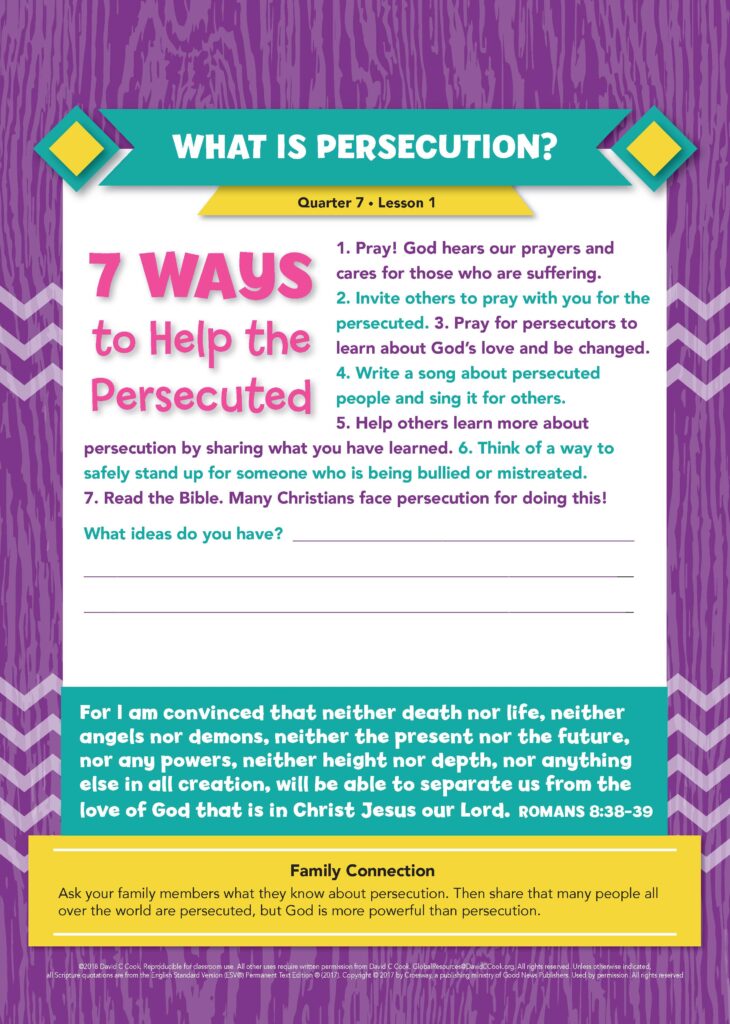During the lesson, the information for you to know is written in regular type, and what we suggest speaking or reading aloud to children is in bold. All resources for this lesson, including the Teacher Guide, Student Page, Family Connection Card, and other resources can be downloaded in a ZIP file by clicking on the following link:
In some lessons you will find "resource articles." These are articles written by experts from around the world to help equip you for your work with children and adolescents. Share them with parents or guardians if you consider it appropriate.
If the world hates you, keep in mind that it hated me first. If you belonged to the world, it would love you as its own. As it is, you do not belong to the world, but I have chosen you out of the world. That is why the world hates you. …
If they persecuted me, they will persecute you also. If they obeyed my teaching, they will obey yours also.
John 15:18–20
Solomon became a follower of Jesus at a young age. Christians in his country often face persecution by religious groups and the government. Solomon and his father were confronted about their faith by their neighbours, whom they had treated with kindness. The neighbours confronted them with machetes, machine guns, and difficult questions. Even after his father was killed and Solomon was soaked with fuel, he refused to denounce his faith. “I will not turn back,” he said. So, Solomon’s neighbours set him on fire.
Though Solomon lost his father and nearly lost his life that day, he does not regret the pain or the scars. “Christ suffered to save me, so I feel I am prepared to suffer in persecution for the salvation I have in Him,” Solomon said. We can learn from Solomon’s example that we can remain strong in our faith, no matter the threat.
Consider the persecution you may have seen or suffered. How did you respond? What did you learn from the experience? As you encounter persecution, remember that you can trust in Jesus when you struggle with the fear and anger caused by persecution.
Encourage the students to ask their families what they know about persecution. They can then share that many people all over the world are persecuted, but God is more powerful than persecution.
Teacher Tip: If possible, email or text the Family Connection Card to the families of your students.
Greet your students as they enter class today. You will start today with a game to demonstrate persecution.
Help your students divide into 3 groups. Give a leaf to each teen in 2 of the groups. Tell them to hold their leaves so that others can see them. The third group will not have any leaves.
We will play a game. Those of you who have leaves will play. Those of you who do not have leaves will stand in this area.
Point to an area that is large enough for the group to stand closely together. Tell them they must be silent and they cannot participate in the game.
Have 1 team with leaves sit down in a line through the middle of your teaching space. The other team with leaves should stand on the outside edges of the space. Choose 1 person from the seated team to try to tag a player from the standing team. The players may walk quickly but should not run. When a player is tagged, he joins the sitting team.
After the tagging player has tagged 2 standing players, he chooses a teammate to take his place. Then he sits down with his team. The new tagger repeats this process. Continue the game until all the players except the tagger are tagged and seated. The game should last about 5–10 minutes.
During the game, the team without leaves can only watch. They cannot talk. They should remain standing and silent during the first 3 questions below.
Ask those who played the game:
Allow 2–3 students to share their thoughts to each of the questions.
Allow 2–3 students to share their thoughts.
Invite the students who were not allowed to participate to come sit with the group. Ask those students the following question.
Allow 2–3 students to share their thoughts.
Some of you were not allowed to play the game even though you had not done or said anything that caused you to be treated differently. Those of you who were able to play the game saw what was happening, but you probably did not know why some of your classmates were being treated differently. You may have wanted to protest about the unfairness. You may have even felt a little guilty that you were allowed to play the game when the others were not able to.
This is a simple example of what persecution may feel like. Because some students did not have leaves, they were treated differently than the rest of you. Though this was just a game, there are many places in the world where persecution is very real and dangerous. Today we will learn more about persecution.
“Persecution” means suffering or being mistreated because of your religious beliefs, ethnic group, social class, or political ideas. It may include being harassed, mocked, beaten, forced out of your home, jailed, or even killed. A simple way to explain persecution is that it is a group mistreating another group because they are different in some way.
Here are some things about persecution you may not know.
Persecution is a worldwide concern. People are persecuted on nearly every continent for their religious and political beliefs, their ethnic groups, and their social classes.
The most common form of persecution is religious persecution, and the most persecuted religion in the world is Christianity. In more than 60 countries, Christians are persecuted by governments or other religious groups.
In some places, those who are persecuted are forced to leave their homes and even their countries to find safety.
Apostasy and blasphemy laws make Christianity illegal in many countries. In these countries, Christians can be jailed, face torture, and even be put to death for their beliefs.
Persecution can occur against a single person or a small or large group.
When a person supports justice and human rights and opposes violence, corruption, and the mistreatment of others, that person could face persecution.
Why do you think persecution happens?
Allow 2–3 students to share their thoughts.
Persecution is most often the strong oppressing the weak. It usually involves an individual or group of people that wants power and control over others or a group of people that considers itself better than another group. Often, the persecuting group feels threatened by the other group.
Why do you think an ethnic, religious, social, or political group might seem threatening to others?
Those who are persecuting others may be afraid of what they do not understand. If there are scarce resources, such as food or land, the powerful group may be trying to keep it all for themselves. Sometimes people persecute others because they are fearful of being persecuted themselves.
I am going to share some examples of persecution that have happened and still are happening around the world. Think about what kind of persecution each represents. There are 4 types: religious, ethnic, political, and social persecution. Often persecution begins for 1 reason and then grows to include other reasons, so these examples may include more than 1 type of persecution.
Persecution has happened throughout history. Because Christians were persecuted in the time of the early church, there are some examples of persecution in the Bible. Listen to what the Bible tells us about Christian persecution.
Have a student read 2 Timothy 3:12 aloud from the Bible. If that is not possible, the verse is printed here.
Everyone who wants to live a godly life in Christ Jesus will be persecuted.
2 Timothy 3:12
Allow students to respond.
Christians are sometimes hated because they do not behave or believe as others do. This lack of understanding can cause fear and anger in others—and sometimes it results in persecution. But Jesus understood fear, anger, and persecution, and He gave His followers advice about how to handle persecution. Listen to what He said.
Love your enemies and pray for those who persecute you.
Matthew 5:44
Allow students to share their thoughts.
God loves all people, even those who persecute others. He reminds us that we should love everyone too, including our enemies. When we pray for those who persecute others, we can pray that God will provide safety and peace for those who are being persecuted. We can also pray that He will change the hearts of the persecutors.
But even if the hearts of those who persecute others are not changed, we can trust in God’s love, even in our most painful and difficult times. Listen to what the Bible tells us about God’s love.
For I am convinced that neither death nor life, neither angels nor demons, neither the present nor the future, nor any powers, neither height nor depth, nor anything else in all creation, will be able to separate us from the love of God that is in Christ Jesus our Lord.
Romans 8:38–39
Persecution is tragic and painful for those who experience it. But we can help to prevent it by making others aware of the causes and dangers of persecution. Here are some things you can do to raise awareness about persecution:
Get into groups of 3. As a group, think about a situation of persecution you have seen, heard about, or experienced. Talk about which of these ideas you would like to try in order to raise awareness in your community. Or you can think of your own ideas. Then, make a plan to try the idea!
Optional: If you are using the Student Pages, the teens can do the activity on the pages as part of this discussion.
Give the students 5 minutes to discuss the situation. Then gather the class together to discuss the activity. If you have time, allow 2–3 groups to share how they want to raise awareness about persecution.

Helping to make others aware of persecution is important. But it is even more important to pray for the persecuted. God is powerful. He hears our prayers and cares for those suffering.
If you are a Christian, you may face persecution. Some of you may have already experienced it. Some of you may have faced persecution for other reasons, such as your ethnic group, your gender, or your political beliefs. You may have been mistreated, mocked, or hurt.
But we are not alone. God promises to never leave us. Listen to this verse we read earlier about God’s love.
Show the Memory Verse poster if you are using it.
For I am convinced that neither death nor life, neither angels nor demons, neither the present nor the future, nor any powers, neither height nor depth, nor anything else in all creation, will be able to separate us from the love of God that is in Christ Jesus our Lord.
Romans 8:38–39

No matter what we face—persecution, abuse, hunger, loneliness—there is nothing that can separate us from God’s love. No matter what we do and no matter what is done to us, His love will never end. It is more powerful than any enemy we face. We can trust that He will be with us when we face persecution.
Close with a blessing based on 1 Corinthians 12:26.
Blessing: May you learn to suffer with those who suffer and rejoice with those who rejoice because you value every life.
Lead the children in singing this quarter’s song, if possible.
Life on Life ©2020 David C Cook. Reproducible for home or classroom use only. All other uses require written permission from David C Cook [email protected]. All rights reserved.